"My mission is me"
Interview with Pastor Dai Jizong
Interview/Liao Meihui
Picture/Zhang Qizhu, Yao Xiuling
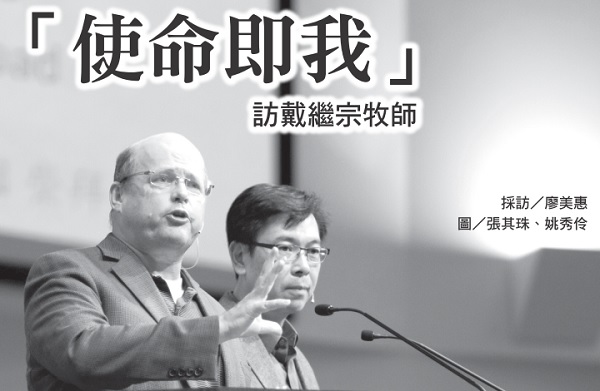
In October 2016, Pastor James Hudson Taylor IV was invited by Ruoge Church in New Jersey to serve as the keynote speaker and special speaker for the missionary workshop of the "Mission Means Me" annual mission conference. During the three-day conference, the author took advantage of the opportunity to interview Pastor Dai several times. Pastor Dai, who is transparent, open-minded, real and funny, and has strong appeal, is like a treasure. There are so many touching missionary stories about him and his family that I couldn’t finish them even in three days and three nights. Thank you to Pastor Dai Jizong (hereinafter referred to as Dai) for his willingness to take time out for the interview despite his tight and tiring schedule.
Question: This time the theme is "Mission is Me", in other words "Mission is Me". What is your view on universal mission?
Wear:Hudson Taylor 1 once said: "The Great Commission is not a choice, but a command." Mission is the Great Commission of every Christian, not just for missionaries. God does not call everyone to be a preacher, but everyone can be a "preacher."
The concept of mission today is different from the concept of mission a hundred years ago. In the past, missionaries had to travel across oceans to distant places, but today’s missionaries do not necessarily have to go to distant places. The target of evangelism is actually all around us. How can you talk about crossing the ocean if you can't even cross the street? "The distance of the missionary field tests our sincerity in missionary work." Distance should not be an obstacle or excuse for missionary work. Regardless of whether it is far or near, we must go out and preach.
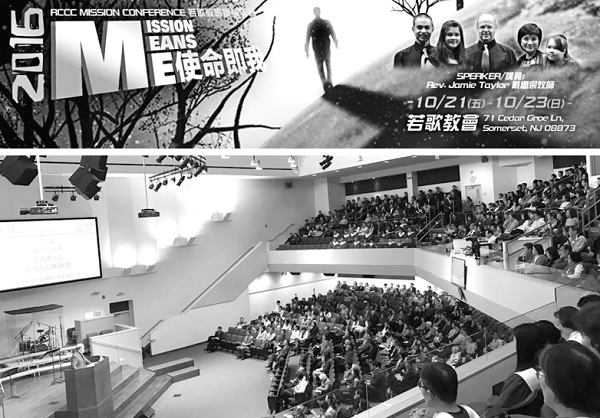
▲Pastor James Hudson Taylor IV was invited by Ruoge Church in New Jersey to serve as the keynote speaker and special speaker of the mission workshop for the 2016 Mission Annual Conference. The theme of the conference was "Mission Means Me".
Q: What are your observations and opinions on the new trends in missionary work in the 21st century?
Wear:The twenty-first century is an important watershed in the mission field. Before that, there were more Western missionaries than non-Western missionaries. After the 21st century, we officially entered an era in which the number of Asian missionaries outnumbered the Western missionaries.
In addition to the concepts of "long-term mission", "mid-term mission" and "short-term mission", the most commonly heard term may be "unreached" (unreached people between 10/40 north latitudes). This area The country accounts for two-thirds of the world's population and is also the most resistant to the gospel. The proportion of Christians is only 1%.
There is another important concept called "quanxuan" (whole-person mission). The society we live in is our diocese, and there are many ways to do ministry, such as "drug, alcohol, and sex" recovery ministry, hospital care ministry, poverty alleviation ministry, prison ministry, family ministry, etc. Included in "Full Propaganda".
"Professional missions" plays a very important role in the 21st century. It allows missionaries to use their professional expertise to preach the gospel in places that cannot be reached as missionaries.
"City Propaganda" is an effective mission to the dense urban population. This is an era of population migration. In particular, China has 300 million migrant workers in cities. The younger generation is especially encouraged to do this.
"Cross-mission" refers to cross-cultural missionary work, missionary work in areas with different languages and cultures.
"Overseas Chinese Propaganda" refers to preaching the gospel to people of the same culture overseas. For example, preaching the gospel to Chinese people from Northeast China in Siberia.
The global missionary field is huge, and we cannot do everything, but we cannot do nothing.
Question: As the fifth generation grandson of Hudson Taylor, what do you think? Does the name "Dai Jizong" bring you a lot of pressure?
Wear:My name was once a burden, now it is a blessing.
When I was a child, this name really put a lot of pressure on me, especially before college. I used to hesitate and rebel, "Can't I choose my own career? Do descendants of missionaries have to become missionaries for generations to come?" Scholar?" But as I grew up, I realized that this name has become the greatest blessing in my life. Being a descendant of the Dai family is a grace given to me by God. It is my honor and my destiny.
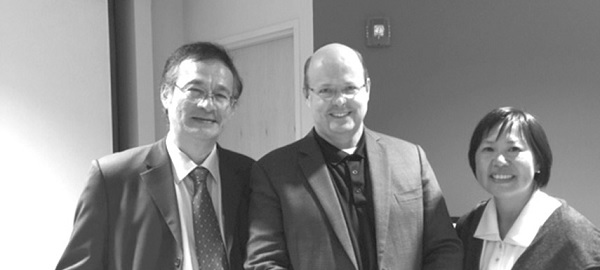
▲Pastor Dai Jizong (middle), the fifth-generation great-great-grandson of Hudson Taylor, said: "In the past, my name was my burden, but now it is my blessing." On the left is Pastor Chen Zhicheng of Ruoge Church, and on the right is our reporter Liao Meihui.
Question: Do you prefer to preach in Chinese or English? What role does language play in the mission field?
Wear:Although English is my mother tongue, I still like to share in Chinese. Chinese and English are my two most commonly used languages, and I can speak Taiwanese too! It is rumored that I speak Cantonese very well, but that is just a rumor. (smile)
Language plays a very important role in communication on the field. Don’t underestimate Chinese. There are Chinese in every corner of the world. Chinese is a good missionary tool. Chinese churches should make good use of this language asset.
Question: What is the most common thing your father, Pastor Dai Shaozeng3, has said to you?
Wear:(Pause for five seconds) The most common thing my father said to me was, "Be serious and don't be too joking." (Laughs)
Question: What do you think is the most right and best thing that your father has done for you?
Wear:My father did not send me to an international school when I was in elementary school, so Chinese became one of my mother tongues, which has affected my life.
At that time, I was studying in a local elementary school in Kaohsiung, and my sister and I were the only "minority students" in the school. So today, I can understand the mentality of "minorities". (laughs again)
Q: What are your expectations for your three children? Were they stressed during their growing up years?
Wear:My wife and I originally asked God for three children. Before the children were born, we planned to name them with the words "Covenant", "Book" and "Yah". The intention was to inherit the covenant that each generation of the Dai family made with God (“As for me and my house, we will serve the Lord.” Joshua 24:15). As a result, God was really faithful to give us three treasures.
My son made a promise and asked me the same question I asked when he was in elementary school: "When I grow up, do I have to be a missionary?" I told him not to feel pressure, as long as he loves God and others and is willing to serve. He is currently in graduate school majoring in education and hopes to teach missionary children after graduation.
I tell my children that there are four occasions in their lives where I must be there. The first is to cut their umbilical cord when they are born; the second is to baptize them when they are baptized; the third is to witness their marriage when they get married; and the fourth is to be a witness when they are willing to dedicate themselves one day.
Q: You have had all three experiences: teaching in seminary, pastoring a church, and serving in a mission agency. How do these three relate to missions?
Wear:These three types of service positions may have different natures of work, but the ultimate goal is the same, and they all revolve around the goals of perfecting the saints, building churches, and spreading the gospel. The seminary equips talents, the church provides missionary resources, and the institution sends missionaries. These three ministries are mutually dependent and should be coordinated and coordinated to fulfill the final commission of Jesus before his ascension to heaven.
Question: How to mobilize and encourage the congregation to participate in missions? What is the basic attitude towards missionary work?
Wear:"Dexterity and willingness"4 are two important attitudes. Dexterity refers to "ability"; willingness refers to "willingness". Generally, Chinese churches are more concerned about the issue of "willingness", whether they have a willing heart. In fact, "whether it can" is also an important consideration. We not only need willing people, but also professional and capable people. The church should encourage members to use their professional professions as channels to spread the gospel and bear witness for God. In this regard, we mentioned some examples in the "Professional Propaganda" topic, such as a Brazilian Christian football coach who went to a Chinese primary school to teach children to play football and spread the gospel to children through the professionalism of football. The church should encourage congregants to “borrow our professions and make our profession of faith.”
Q: Can you talk about a few important and unforgettable scenes and moments in your life?
Wear:When my father and I go out, most people call him "Pastor Dai" and me "Pastor Dai". I have been to many places with my father and had many unforgettable scenes. For example: In 1983, I went back to China for the first time with my father and eleven members of my family on a "root-seeking trip." Three years later, news came from China that Hudson Taylor's tomb was found in a museum in Zhenjiang. Then many unexpected miracles happened one after another.
We started searching for our roots in 1983. Thirty years later, in 2013, we held an incredible "coffin moving service" and moved the graves of Hudson Taylor and his wife found in the Xiqiao Cemetery in Zhenjiang City to a church in Zhenjiang, Jiangsu Province. , later the church was named "Xuande Hall", and a Taylor Memorial Museum was built behind the church.
Another unforgettable experience was in 2001, when my father and I went to Kashgar, Xinjiang to visit my grandfather5’s main co-workers in Shaanxi at that time, Zhao Maijia and He Enzheng6. At the moment of saying goodbye at the airport, He Eun-chen grabbed my hand and said softly to me: "I have a stick in my hand. I have held it for sixty years. I don't know how much longer I can hold it. Can you please take it?" Drop this gospel stick!”

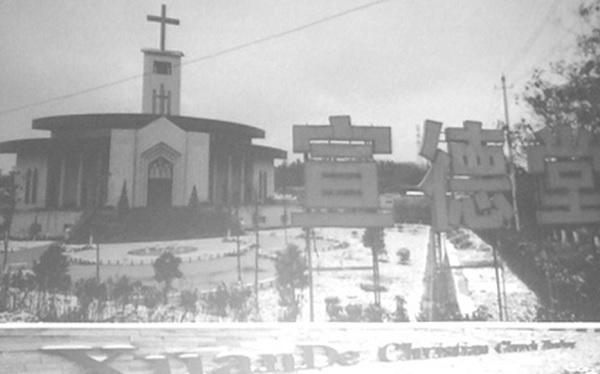
▲The picture shows Pastor Dai Jizong’s information in the missionary workshop. He said that the greatest significance of the Taylor Memorial Hall located in Zhenjiang Desuan Hall is to “win China to the Lord through our tombs.”
Q: What is the significance of the Hudson Taylor Memorial to your family and missions?
Wear:The greatest significance of the memorial hall is "to win China to the Lord through our graves."
This sentence actually comes from a sentence said by my great-great-grandmother's father (Talson Taylor's father-in-law) Taylor. The process from the journey of finding the roots to finding the tomb and then to the establishment of the memorial hall is truly a miracle. As long as one step was wrong, the result today would not be possible. The memorial is not to exalt a person, but to testify to the power of God. The exterior construction of the memorial hall has been completed, and now it is entering the interior decoration and exhibition stage. It is expected to be completed in the second half of 2017. I hope this memorial hall is free to enter and dedicated to the public. It is not about giving money, but it is about being willing to give your life. We hope to use this memorial hall to inspire the Chinese church community to value missions and give more people the missionary motivation to “go! Make disciples of all nations.”
Question: What expectations and encouragement do you have for the Chinese church?
Wear:Today's Chinese churches have greater ability to send more missionaries to participate in "cross-promotion", not just to evangelize Chinese people of the same culture. The Chinese church should no longer be a recipient, but a giver. Hudson Taylor once said, "I'm not worried about missionaries not having money, because God will provide it; what I'm worried about is having money but no missionaries."
Have the Chinese churches thought about making good use of Chinese as a language tool? Not only English can be used as a teaching tool. There are many people overseas who want to learn Chinese. They can think more about "teaching Chinese" as a channel for evangelism.
Two hundred years ago, Western missionaries dedicated their lives to come to China. I hope that today our Chinese church can send more missionaries to take over the gospel.
Here, I would like to encourage everyone by using a sentence my father said: "May the spirit that moved Taylor Taylor move us even more." I hope that all disciples of Jesus will follow the Lord faithfully throughout their lives and do the Lord's work diligently at all times.
postscript
Meeting God at the beach
In order to prepare for this interview, the author accidentally discovered a coincidence when searching for information: Important moments in the lives of three generations of Hudson Taylor, Pastor Dai Shaozeng and Pastor Dai Jizong all happened at the seaside.
‧ In 1865, Hudson Taylor wrote in his diary, "Today, God has subdued my unbelief..." At that time, Taylor was meditating on the beach in Brighton, England. He had previously tried to find a British mission to send missionaries to China, but they were all rejected. It was on that seaside that Taylor finally obeyed God and was willing to found a mission, asking God for twenty-four skillful and willing co-workers. The next day, Taylor went to a London bank to open an account for the China Inland Mission with ten pounds. From that moment on, the name China Inland Mission was officially born. At that moment, Hudson Taylor said the famous saying that moved countless Chinese Christians: "If I had a thousand pounds of gold, China could withdraw it all; if I had a thousand lives, I would never leave any of them to China. No!" Not China, but Christ.”
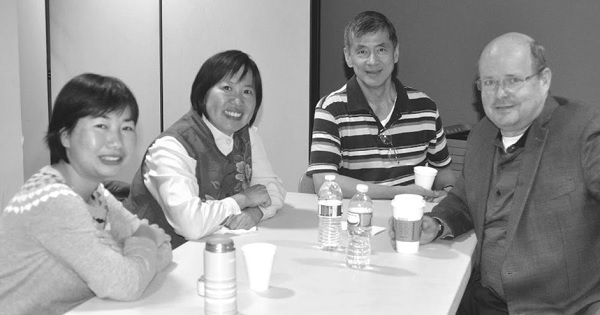
▲The infectious Pastor Dai is like a treasure mountain. His transparent, open and humorous personality leaves a deep impression on everyone. The picture shows a group photo with brothers and sisters after the meeting.
‧ In 1980, Pastor Dai faced a major decision in his life: whether to take over the mantle of the "Overseas Christian Mission". One day he was walking on the beach in Singapore and picked up a small bottle. He remembered what Paul said in 2 Corinthians 4:7: “We have this treasure in earthen vessels, so that we may show that this great power comes from God. It’s not from us.” Then it became clear to him that God himself had called him to Singapore. In the same year, Pastor Dai handed over the baton of the "China Evangelical Theological Seminary" to President Lin Daoliang. Pastor Dai said that his father's bottle is still in his home.
‧ In 2015, Pastor Dai went on another root-seeking journey. 150 years ago, my great-great-grandfather Hudson Taylor made the most important decision in his life at Bright Seaside. Pastor Dai came there to hold the 150th anniversary ceremony and baptized his youngest daughter Chengya there, making the sixth daughter of the Dai family Generations have also participated in the inheritance of family beliefs that continue to this day.
Thank you to this family who loves Chinese people. The author firmly believes that the beautiful stories and faith inheritance of the six generations of the Dai family will continue to be passed down "from generation to generation" and "daidai".
Note 1. James Hudson Taylor (1832~1905) was a missionary in China for fifty-one years and the founder of China Inland Mission (today’s Overseas Christian Mission).
Note 2. The descendants of Hudson Taylor and his wife Maria include the second-generation son Dai Cunren, the third-generation grandson Dai Yongmian, the fourth-generation great-grandson Dai Shaozeng, and the fifth-generation great-great-grandson Dai Jizong. The five generations of the Dai family have stood firm in the gospel position and ministered to each generation from generation to generation. Inherited to this day.
Note 3. James Hudson Taylor III (1929-2009), founder of the Chinese Evangelical Theological Seminary in Taiwan, became the seventh general director of the Overseas Christian Mission in 1980. In 1993, "International Professional Services Institute" (MSI) was founded in mainland China.
Note 4. From 1 Chronicles 28:20-21
Note 5. Dai Yongmian (1894~1978) established the "Northwest Bible College" in Shaanxi in 1941, and later founded the "Holy Light Theological Seminary" in Kaohsiung, Taiwan.
Note 6. Co-founders of the "Evangelization Group", this couple is hailed as "the heroic couple of the Kingdom of God's missionary pioneers in southern Xinjiang" and the last group of people in China's "Return to Jerusalem Movement" in the 1940s, He Enzheng (1907 ~2014) at the age of ninety-seven.
Note 7. "The Biography of Taiyoer to Death", written by Dai Shaozeng and Chen Yiping, 2009.
Pastor Dai Jizong’s profile
Born in Taiwan in 1959 to a Christian family. He and his wife Dai Ke Yuemin have one son and two daughters: Cheng "Yue", Cheng "Shu" and Cheng "Ya". At university, he studied at Seattle Pacific University and Asbury Theological Seminary for a bachelor's degree and a master of divinity. In 2011, he completed a doctorate in pastoral ministry from Asprey Theological Seminary, with a thesis titled "The Awakening of Cross-Cultural Mission in the Chinese Church." He worked with Pastor David Adeney of the Inland Mission in the "Pray for China" fellowship for two years (1982-84). He once pastored the Boston Chinese Bible Church with Pastor Li Xiuquan and his wife for five years (1987-90, 1993-95). In 1996, his family moved to Hong Kong and served as the personnel director of the Chinese Ministry of Overseas Christian Mission. In April 2014, he was invited to take charge of the church development of the "Overseas Christian Mission" China ministry, promoting the cultivation of leaders, strengthening the church, and promoting cross-cultural missions.
 Reporter Profile Liao Meihui is from Taiwan and has a son and a daughter with her husband Wang Zhiyuan. Certified Montessori teacher, children’s Sunday school teacher at Ruoge Church in New Jersey, part-time student at North American Chinese Evangelical Theological Seminary, and special correspondent for Kingdom of God magazine. Calling: Teacher and literary work.
Reporter Profile Liao Meihui is from Taiwan and has a son and a daughter with her husband Wang Zhiyuan. Certified Montessori teacher, children’s Sunday school teacher at Ruoge Church in New Jersey, part-time student at North American Chinese Evangelical Theological Seminary, and special correspondent for Kingdom of God magazine. Calling: Teacher and literary work.
